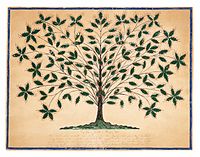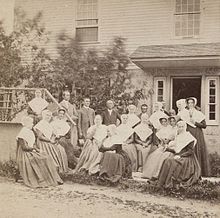 |
| Topics |
|---|
| Notable people |
|
Founders
Other members |



The Shakers are a sect of Christianity which practices celibacy, communal living, confession of sin, egalitarianism, and pacifism. After starting in England, it is thought that these communities spread into the cotton towns of North West England, with the football team of Bury taking on the Shaker name to acknowledge the Shaker community of Bury. The Shakers left England for the English colonies in North America in 1774. As they gained converts, the Shakers established numerous communities in the late-18th century through the entire 19th century. The first villages organized in Upstate New York and the New England states, and, through Shaker missionary efforts, Shaker communities appeared in the Midwestern states. Communities of Shakers were governed by area bishoprics and within the communities individuals were grouped into "family" units and worked together to manage daily activities. By 1836 eighteen major, long-term societies were founded, comprising some sixty families, along with a failed commune in Indiana. Many smaller, short-lived communities were established over the course of the 19th century, including two failed ventures into the Southeastern United States and an urban community in Philadelphia, Pennsylvania. The Shakers peaked in population by the 1840s and early 1850s, with a membership between 4,000 and 9,000. Growth in membership began to stagnate by the mid 1850s. In the turmoil of the American Civil War and subsequent Industrial Revolution, Shakerism went into severe decline. As the number of living Shakers diminished, Shaker communes were disbanded or otherwise ceased to exist. Some of their buildings and sites have become museums, and many are historic districts under the National Register of Historic Places. The only active community is Sabbathday Lake Shaker Village in Maine, which is composed of at least three active members.